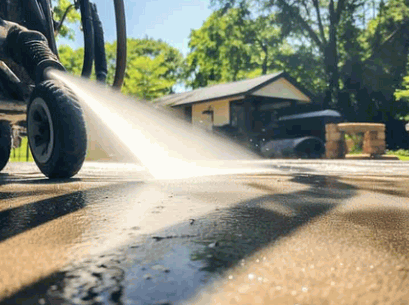Are you considering a stylish and durable option for your driveway? A resin driveway could be the perfect solution.
This article explores what quality resin is, the differences between resin bound and resin bonded systems, and the numerous benefits of choosing a resin finish.
From its aesthetic appeal and low maintenance needs to the installation process and costs involved, this guide covers it all.
Discover the types of resin available, such as Polyurethane resin, and how to keep your driveway looking its best. Find out if a resin driveway is right for you!
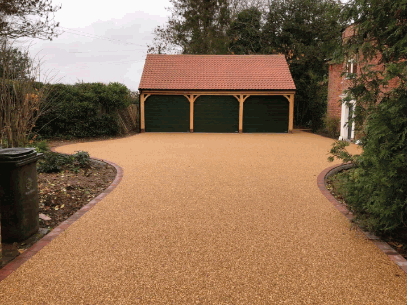
What Is Resin?
Resin is a versatile material widely used in construction and landscaping, particularly in resin-bound paving, which involves mixing quality resin with aggregate stones to create a durable surface. This eco-friendly option provides an attractive finish that is both slip-resistant and SUDS compliant, making it suitable for various applications including driveways, tree pits, and nature walks.
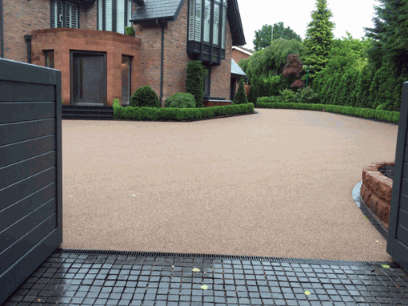
What Is The Difference Between Resin Bound And Resin Bonded?
The difference between resin-bound and resin bonded paving lies primarily in the installation process and the resultant surface characteristics, with resin-bound paving creating a seamless, flexible surface using a resin aggregate mix that incorporates aggregate particles, while resin bonded paving uses a coat of resin over an existing substrate.
Both methods offer unique attributes that cater to various preferences and requirements. For instance, resin-bound surfaces are renowned for their aesthetic appeal, providing a smooth, even finish that exemplifies a modern look and feel, making it an excellent option for home valuation.
In contrast, resin bonded paving can create a more textured surface, which may suit certain decorative styles better. Regarding durability, the continuous nature of resin-bound paving typically offers greater resistance to cracks, making it an excellent choice for high-traffic areas such as driveways and walkways. Meanwhile, resin bonded options, while visually striking, may require more frequent upkeep due to wear and tear.
- Maintenance: Maintaining resin-bound surfaces is relatively straightforward, requiring only occasional cleaning to remove debris, including moss, algae, and detritus. On the other hand, resin bonded surfaces might necessitate periodic re-coating to enhance their lifespan.
- Suitability: The choice between the two methods often hinges on the specific use case; resin-bound is ideal for continuous walkways, while resin bonded might be preferable for decorative patios.
Understanding these distinct characteristics helps in making an informed decision that suits one’s needs and aesthetic preferences.
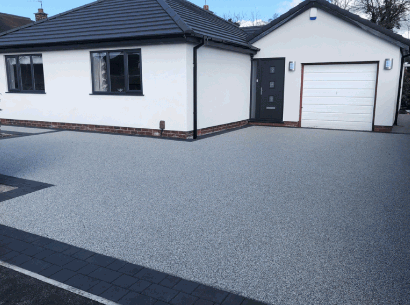
What Are The Benefits Of A Resin Driveway?
A resin driveway offers numerous benefits, making it a popular choice for homeowners looking to enhance their property. It provides a low-maintenance option that is UV resistant, ensuring that colors do not fade under sunlight while delivering excellent slip resistance and a durable surface that can withstand both pedestrian and vehicle traffic.
Aesthetics
One of the most notable advantages of resin-bound paving is its aesthetics, offering a decorative finish that can be customized with various aggregate stones and even crushed glass to create unique, visually stunning driveways.
This captivating versatility allows homeowners to personalize their driveways in a way that resonates with their overall design preferences. Whether opting for earthy tones to harmonize with a rustic home or vibrant hues for a more contemporary feel, the myriad of color variations enhances curb appeal significantly. A resin-bound driveway not only serves functional purposes but also acts as an inviting introduction to a residence.
- Indeed, using decorative finishes can elevate ordinary spaces.
- Integrating varied aggregate stones ensures that no two driveways are alike, fostering a sense of individuality.
- Studies suggest that such enhancements can lead to increased home valuation, appealing to prospective buyers drawn to properties with beautiful exteriors.
Homeowners are increasingly recognizing the value of aesthetics in paving, knowing it contributes positively to their property’s worth.
Durability
Resin driveways are known for their durability, designed to withstand heavy vehicle traffic and pedestrian use, thanks to their superior flexural performance that ensures they remain intact under various conditions, making them suitable for heavy traffic.
The choice of materials plays a pivotal role in achieving this impressive resilience. By incorporating high-quality aggregate materials infused with a robust resin binder, these driveways exhibit exceptional strength, making them suitable for both residential and commercial applications.
When considering long-term resilience, it's essential to note that the UV stability of the resin prevents discoloration and degradation over time. The flexibility of the material allows it to absorb shock and movement without cracking, thus preserving its integrity regardless of traffic volume.
- Ideal for driveways subject to heavy vehicles.
- Maintains aesthetic appeal despite wear.
- Resistant to weather-related damages.
Consequently, resin driveways prove to be an outstanding investment for those seeking a lasting solution that balances beauty with functionality.
Low Maintenance
Another significant benefit of resin driveways is their low maintenance requirement, as they are designed to resist the growth of moss, algae, and detritus, making it easy to keep them clean and visually appealing.
These driveways require minimal effort from homeowners to maintain their pristine condition. Regular cleaning can simply involve:
- Using a broom or blower to remove leaves and other debris.
- Applying warm soapy water for a deeper clean, revitalizing the surface without damaging it.
- Occasional pressure washing can help eliminate stubborn stains.
Thanks to their unique structure, resin driveways do not support weed growth, eliminating the hassle of dealing with invasive plants that can mar appearance over time. This low maintenance aspect combined with their aesthetic durability ensures that they remain a homeowner's pride without requiring constant attention.
Permeability
Resin driveways are designed as permeable paving options, allowing for efficient drainage and moisture contact, which is crucial for SUDS compliance in urban areas.
Implementing such innovative solutions can significantly enhance urban landscapes by reducing surface water runoff, which often contributes to flooding and water pollution, and supports sustainable urban drainage systems.
By allowing water to seep through the surface, these driveways help replenish groundwater resources and decrease the burden on conventional drainage systems. This can lead to a smoother flow of stormwater, mitigating the risks associated with urban flooding.
- Permeable paving plays a vital role in urban planning, supporting sustainable development and promoting biodiversity.
- It can aid in controlling pollutants that might otherwise wash into local watercourses, fostering healthier ecosystems.
In this context, the impact on moisture management is transformative, ensuring that urban areas become more resilient to climate variability while maintaining aesthetic values in line with standards such as BS 8204-6:2008+A1:2010.
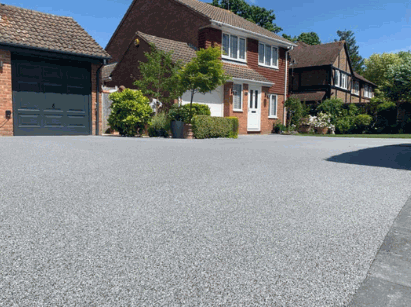
How Is A Resin Driveway Installed?
The installation process of a resin driveway involves several critical steps that ensure a durable and high-quality surface, starting with the preparation of the ground followed by the careful mixing and laying of the resin aggregate mix to create a seamless finish.
Preparation Of The Ground
Preparing the ground is a fundamental step in the installation of a resin driveway, involving the assessment and leveling of the existing substrate to ensure proper drainage and a stable base for the resin aggregate mix.
This critical phase not only establishes a reliable foundation but also directly affects the longevity and performance of the driveway. Proper ground preparation includes:
- Assessments for drainage: Ensuring that water can freely flow away from the driveway prevents potential pooling and structural damage, enhancing flexural performance.
- Stability checks: Evaluating the strength of the existing substrate is crucial, as weak bases can lead to cracking or shifting over time.
- Techniques for effective preparation: Techniques such as compacting the base material and applying geotextiles can greatly enhance stability and drainage effectiveness.
By addressing these factors, homeowners can enjoy a durable and aesthetically pleasing resin driveway that stands the test of time, appealing to those who value both durability and low maintenance.
Mixing And Laying The Resin
The mixing and laying of the resin aggregate mix is a critical phase in creating a resin driveway, requiring precision to achieve the right consistency and uniformity of the aggregate stones within the resin for a high-quality finish.
To ensure optimal results, the correct mixing ratios are essential. Typically, a common ratio is resin to aggregate of 1:4 by volume, but this can vary slightly based on the specific product used. The process begins by thoroughly combining the resin with the aggregates in a mixing container.
Here are some techniques and tips to enhance the laying process of resin-bound paving:
- Mix thoroughly: Use a paddle mixer for at least 3-5 minutes to achieve a consistent blend, ensuring all aggregates are coated evenly.
- Laying technique: Pour the mixture onto the prepared sub-base and spread it with a trowel or squeegee.
- Achieving an even surface: After laying, use a roller to compact the surface and eliminate any air bubbles, providing a smooth finish.
By focusing on these key aspects, one can create a durable and aesthetically pleasing driveway that withstands the test of time.
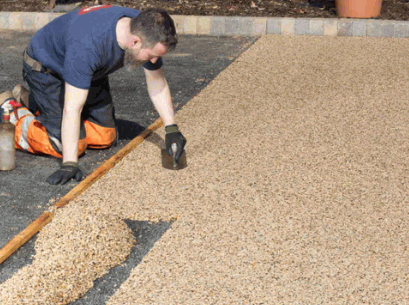
Finishing And Curing
Finishing and curing are essential steps in the installation of a resin driveway, ensuring that the surface achieves its full durability and UV resistance, allowing it to withstand the elements and maintain its aesthetic appeal.
Proper curing times not only influence the immediate look of the driveway but also play a crucial role in its long-term performance.
When the curing process is rushed, it can lead to issues such as cracking or color fading, thus compromising the driveway's integrity. To achieve optimal results, it's advisable to follow specific techniques during the finishing phase.
- Utilizing a sealant can provide an extra layer of protection against UV light and weathering.
- Regular maintenance checks to monitor for wear can help prolong the driveway's life.
Ultimately, investing time in these steps ensures that the driveway remains not just visually appealing but also robust against the test of time.
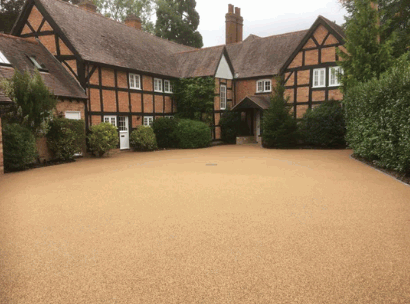
What Is The Cost Of A Resin Driveway?
The cost of a resin driveway can vary significantly depending on factors such as the type of aggregate stones used, the size of the area, and the complexity of the installation process.
To attain a clear understanding of the overall expenses involved, it’s essential to examine various cost factors that can impact the final price. This includes everything from the quality of materials selected to the specific installation techniques employed. Budgeting for a resin driveway should also take into account the regional price variations that may influence labor and material costs, which can differ drastically across different areas.
- Material Choices: Opting for premium aggregate stones will generally increase the overall cost.
- Installation Complexity: More intricate designs require skilled labor, thus raising expenses further.
- Size of the Area: A larger surface area naturally demands more materials and labor.
By considering these factors, homeowners can make informed decisions and prepare a realistic budget for their resin driveway project.
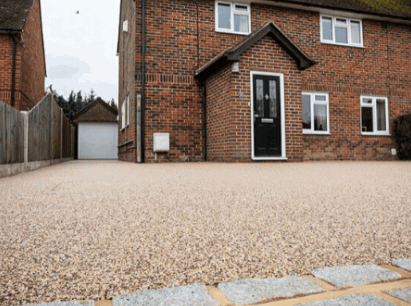
What Are The Different Types Of Resin Used For Driveways?
There are several types of resin used for driveways, with the most common being polyurethane resin, epoxy resin, and acrylic resin, each offering unique benefits and characteristics suitable for various applications.
Polyurethane Resin
Polyurethane resin is a popular choice for resin driveways due to its flexibility, UV resistance, and excellent bond strength, making it ideal for various climate conditions and traffic levels.
This versatile material not only ensures a stunning aesthetic appeal but also builds a robust foundation that withstands heavy loads and frequent use. With its remarkable flexibility, polyurethane resin adapts seamlessly to shifting ground conditions, which minimizes the risk of cracking.
In regions exposed to harsh sun or unpredictable weather patterns, this resin shines due to its UV stability, preventing color fading and deterioration over time. Its water-resistant nature helps in managing drainage effectively, thereby increasing longevity and reducing maintenance woes.
- Properties that enhance performance:
- Adaptable to various temperatures
- Resistant to chemical spills
- Seamless application process
Such attributes make it an exceptional choice for driveways that are not just visually appealing but also functional and enduring.
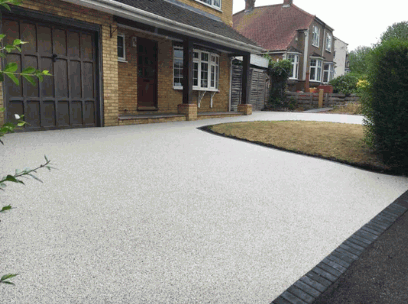
Epoxy Resin
Epoxy resin is recognized for its exceptional durability and chemical resistance, making it another great option for driveways, especially in areas with high vehicle traffic.
This remarkable material is not just about strength; it also offers a sleek and polished finish that enhances the aesthetic appeal of any property. When comparing epoxy resin to traditional asphalt or concrete, one can see that while it protects against oils and other chemicals—reducing the risk of staining—its installation can be slightly more complex.
- Epoxy is less prone to cracking than concrete, making it a solid long-term investment.
- It may not be as cost-effective upfront compared to asphalt, which can deter some homeowners.
Ultimately, the choice between epoxy and other resins relies on individual needs, budget, and desired longevity.
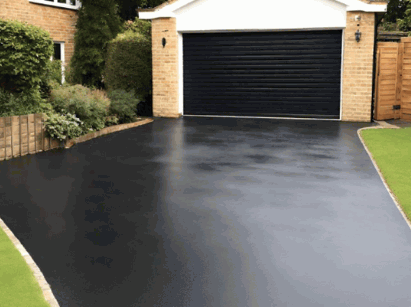
Acrylic Resin
Acrylic resin is often chosen for its quick curing time and vibrant color options, although it may not be as durable as polyurethane or epoxy resins, making it more suitable for low traffic areas.
Regarding driveways, acrylic resin offers both advantages and disadvantages that homeowners should consider. One significant pro is the ability to customize driveways with a wide range of colors and finishes, allowing for a unique aesthetic appeal. In addition, its quick curing time means that the installation process is generally faster, which can be appealing for those looking to minimize disruption.
The limitations of this material come into play particularly in high-traffic scenarios. It tends to wear down more quickly and may need more frequent maintenance compared to other materials. To help clarify:
- Advantages: Quick installation, vibrant colors, good for decorative applications.
- Disadvantages: Lower durability, higher maintenance needs, less resilient in heavy use areas.
Ultimately, while acrylic resin has its place, it's essential to weigh these factors based on individual needs and usage patterns.
How To Maintain A Resin Driveway?
Maintaining a resin driveway involves regular cleaning and upkeep to prevent the growth of moss, algae, and detritus, ensuring the surface remains appealing and functional over time.
Discover: How To Clean A Resin Driveway
